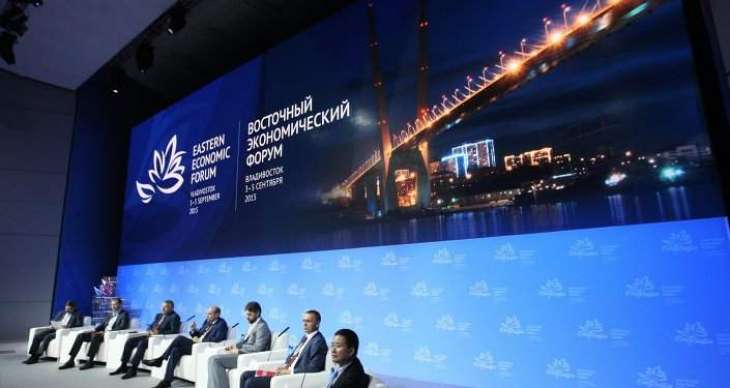Russia could play a leading role in developing multilateral energy market in the Asia-Pacific, since it is a key supplier to major regional energy importers including China, South Korea and Japan, a United Nations energy official told Sputnik on the sidelines of the Eastern Economic Forum in Vladivostok on Tuesday.
VLADIVOSTOK (Pakistan Point News / Sputnik - 11th September, 2018) Russia could play a leading role in developing multilateral energy market in the Asia-Pacific, since it is a key supplier to major regional energy importers including China, South Korea and Japan, a United Nations energy official told Sputnik on the sidelines of the Eastern Economic Forum in Vladivostok on Tuesday.
"Russia and China have already enjoyed deep bilateral energy cooperation. But in terms of multilateral energy cooperation, I believe Russia could play a leading role. That is because Russia is a major exporter of energy products such as electricity, crude oil and natural gas to China, South Korea or Japan. Russia is in a good position to transit the bilateral cooperation into a multilateral framework. That is also why Russia is actively promoting energy cooperation in the Asia-Pacific," Liu Hongpeng, the director of the Energy Division at the UN Economic and Social Commission for Asia and the Pacific (ESCAP), told Sputnik.
The UN official noted that the multilateral energy cooperation in the Asia-Pacific could help promote cleaner energy and improve energy security for nations in the region.
When it comes to building a regional interconnected power network, Russia's electricity supply faces possible challenges in the Chinese market, as neighboring Chinese regions such as Northeast China have built up power generation capacities in recent years and are expected to experience overcapacity in the near future, Liu explained.
"Northeast China used to have massive demand for electricity. But exactly because of this, local governments in the region built up power generation capacities, while local power consumption growth slowed after heavy industries went through restructuring. The newly added capacity continued to go up, which led to the change in local demand for electricity," he said.
Nevertheless, the expert pointed out that power supply from Russia's Far Eastern regions continued to hold advantage over domestic Chinese electricity production, because electricity from hydro power stations in Russia could help bring cleaner energy into China.
"Most of the electricity generated in Russia's Far East regions come from hydro power stations, which is a cleaner source of energy. The prices from Russia's hydro-generated electricity are relatively low. From the point of view of regional sustainable growth and how to improve the power grid's efficiency in taking advantage of cleaner energy sources, this kind of regional cooperation becomes necessary. That is also because renewable energy sources in Northeast China are rather limited," Liu said.
The UN energy expert added that, compared to importing energy commodities such as oil or natural gas, importing electricity directly could also help save money on building new power plants.
As one of the world's largest energy consumers and importers, South Korea could be an ideal destination for Russian energy exports. However, the nuclear crisis on the Korean Peninsula has made it difficult for Russian energy products, especially electricity, to reach South Korea.
The UN energy expert suggested that Russia could look for alternative methods, such as underwater power lines, to transmit its electricity to South Korea, as the nuclear crisis on the Korean Peninsula is unlikely to be resolved quickly in the near future.
"There are many options to build a interconnected power network in Northeast Asia. The most direct method is to transmit the power through North Korea to South Korea. But politically, it may be very difficult to make it happen in the near future. One alternative is to transmit the electricity through underwater power lines from Russia's Far East to South Korea or even to Japan. Such technology already exists. The question is whether market demand for electricity imports is strong enough to cover the cost of building such a network," Liu said.
Based on today's electricity prices in South Korea, power exports from Russia could be financially feasible, as long as electricity demands remain strong, the expert added.
Successful exploration and mature extraction technology allowed US shale oil and gas to boost share in the global energy market. As energy supply and exports from the United States to Northeast Asia continue to grow, Russian energy exports to the region could face growing pricing pressure.
However, the UN energy expert believed rising competition from the United States could become a good opportunity for Russia to improve the efficiency of its energy exports to Northeast Asian countries.
"I am sure Russia is feeling the pressure. But I believe the competition can help push Russia to adjust its previous strategy [on energy export]. I think competition can motivate growth. Russia used to focus more on the energy market in Europe, without paying much attention to markets in the east. But out of the top five energy importers in the world, three of them are in Northeast Asia. I believe Russia needs to divert its attention to the Asian energy markets more and help establish a close energy cooperation framework in the Asia-Pacific," he said.
The expert noted that Russia has already started to lead energy cooperation initiatives in the region by hosting dialogues on the issue through various conferences and events such as the Eastern Economic Forum.
At the same time, the expert added that most countries would try to diversify the sources of energy supply to ensure their long-term energy security.
"China, South Korea and Japan are the major energy consumers and importers in Northeast Asia. But they will not rely on one single source of energy supply from the middle East, Russia or the United States. They have to try to diversify the energy supply sources," he said.
The expert pointed out that, as an energy exporter, Russia also needed to secure demands for its energy products in various markets in the world.




